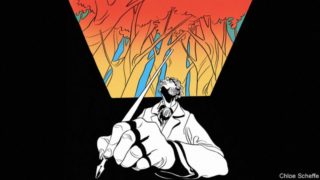The poet’s spell in isolation because of cholera in 1830 was the most productive period in his life
BY THE END of the summer of 1830 Alexander Pushkin was in a state of anguish and spleen. The news of cholera spreading from Asia into Russia was the least of his worries. His engagement was on the brink of breaking down, his finances were under strain and his ambivalent relationship with the tsar was becoming untenable.
Nicholas I, a humourless and ruthless autocrat, had begun his reign by executing five aristocrats who had led the Decembrist uprising against him in 1825; another 120 conspirators were exiled to the far reaches of the Russian empire. Many were close friends of Pushkin. He had himself been exiled to his mother’s estate a year earlier on account of his atheistic ideas. Had he been in St Petersburg he would have been among the rebels, he candidly acknowledged when summoned to meet the tsar.
Releasing and pardoning the country’s most popular poet was meant to mollify the Russian elite. Nicholas also pledged to act as Pushkin’s patron and personal censor, in place of the regular one. In practice, Pushkin had to clear every piece of writing with the tsar and endure the attentions of Count Alexander Benckendorff, the founder of Russia’s secret police. Pushkin felt suffocated and restless. He requested permission to travel, to Europe or China or anywhere else, but was invariably turned down. A short trip to the war in the Caucasus—in Russia, the favourite danger zone of the romantic age—resulted in a humiliating rebuke from Benckendorff.
These political tensions were jeopardising his wedding plans. At 30, Pushkin longed for a private family life, shielded from both the state and his admirers (if that impulse violated the romantic notion of the poet as heartbroken loner, so did his view of literature as a profession). But his prospective mother-in-law was nervous about marrying her beautiful 17-year-old daughter, Natalia Goncharova, to a man under surveillance. At Pushkin’s request, Benckendorff wrote to say he was merely giving friendly counsel to the poet, not snooping on him. Still, there was another hurdle: Natalia’s mother insisted on a dowry, and since her finances were in disarray, the groom would have to provide it. But Pushkin, who made his living by his pen, had no spare funds to indulge her pride.
Amid these dramas, he was obliged to travel to Nizhny Novgorod province, 250 miles east of Moscow, to take formal possession of Boldino, a small estate where his grandfather had lived and which was now a wedding present from his father. Just before he set out, and after a nasty run-in with Natalia’s mother, he told his friend and publisher Pyotr Pletnev that he felt sad and tormented: “The life of a 30-year-old fiancé is worse than 30 years in the life of a gambler…Devil possessed me to think about happiness as though I am made for it.”
Une très jolie personne
He faced one final source of frustration: autumn was Pushkin’s favourite and most productive season. It was when he wrote best. Now, it seemed, he would spend it preparing for a wedding that might never happen. On September 1st he left Moscow, expecting to be back in a couple of weeks. His muses must have been smiling.
Pushkin travelled light, taking a few manuscripts and a volume of English verse containing “dramatic scenes” by Barry Cornwall, an English poet whose real name was Bryan Procter, and John Wilson, a Scot. After three days he arrived at Boldino, an 18th-century estate surrounded by monotonous, woodless steppe dotted with poor peasant dwellings, plus a graveyard spiked with dark wooden crosses. He planned to stay no longer than he had to.
Five days later, on September 9th 1830, he found himself in lockdown. The cholera epidemic had reached Nizhny Novgorod province and the area was cordoned off to stop it spreading. Suddenly, Pushkin felt contented and relieved. All his prior anguish—and its causes—receded. “My dark thoughts have dissipated: I am now in the country and enjoying myself,” he wrote to Pletnev. “You cannot imagine how joyous it is to run away from a fiancée and to sit here and write poetry…You can ride horses as much as you want, write at home as much as you please, and be disturbed by no one.”
That day he wrote “The Undertaker”, a grotesque short story about a coffinmaker who invites his dead customers to a housewarming party. Pushkin was playful and mischievous. He hung out with peasant girls and went to the local church to deliver a prank sermon. “The cholera has been sent to you, brothers, because you don’t pay your levies and drink too much,” he told the peasants. “If you carry on like this you will be whipped. Amen.”
Stuck behind several quarantine cordons, besieged by a raging disease (“une très jolie personne”, as Pushkin termed it), he felt as free and as happy as he ever had. The three months he spent at Boldino were the most productive in his life. He at last finished “Eugene Onegin”—an ingenious novel in verse that he had been working on for seven years and would become a classic of Russian literature—as well as a series of dramatic sketches based on the British efforts he had brought with him, which he entitled “Little Tragedies”.
A strange and savage joy
Pushkin, who would never be allowed to travel outside Russia and was now stranded in the countryside amid “rain, snow and mud up to your knees”, leapt across historical epochs, countries and genres—from the medieval French tower in “The Miserly Knight” to Vienna in “Mozart and Salieri”. “The Stone Guest” swept from the gates of Madrid to the balcony of one of Don Juan’s lovers, where (in James Falen’s translation) “the night/Of laurel and of lemon smells; the moon…/All gleaming in the deep and darkling blue…/The watchman calling out his long: All’s well!” As Dostoyevsky put it, Pushkin was able to “accommodate the geniuses of other nations within his soul as if they were his own”.
This surge of creativity was not due only to his escape from nagging concerns. The threat of cholera and the risk of death exhilarated him. As Yuri Lotman, a literary scholar, explained, for a generation of Russian aristocrats born in the late 18th and early 19th centuries, shaped by romanticism and inspired by the Napoleonic wars and European revolutions, death was associated with youth and bravery rather than old age and illness. “Wounds were a subject of envy rather than pity,” Lotman wrote of Pushkin’s time.
In an era and a country in which surveillance, censorship and humiliation were the norm, the risk of being killed by an enemy bullet, or even in a natural disaster, offered a perverse prospect of dignity and freedom—the two things Pushkin valued most. This sense of personal liberty and defiance is the leitmotif of “A Feast During the Plague”, the last and shortest of the “Little Tragedies” that he wrote at Boldino.
He introduced the piece as “an excerpt from Wilson’s tragedy, ‘The City of the Plague’.” Set in London during the pestilent summer of 1665, Wilson’s play paints a morbid picture of an empty city traversed by “a miserable cart/Heap’d up with human bodies”. Pushkin, however, focused on a single scene, in which a group of youngsters carouse in a spontaneous street party and toast a deceased friend. The centrepiece is a hymn of Pushkin’s own devising, dedicated by the “master of revels” to the plague, which has already claimed the character’s wife and mother:
There’s rapture on the battleground,
And where the black abyss is found,
And on the raging ocean main,
Amid the stormy waves of death,
And in the desert hurricane,
And in the Plague’s pernicious breath.
For all that threatens to destroy
Conceals a strange and savage joy—
Perhaps for mortal man a glow
That promises eternal life;
And happy he who comes to know
This rapture found in storm and strife…
We’ll sip the rosy maiden wine
And kiss the lips where plague may lie!
When his confinement was over, the poet finally married Natalia. In 1837, after his brother-in-law tried to seduce her, Pushkin would be killed in a duel. But he did not have a death-wish, exactly—rather, the proximity of death made him feel alive. When a second wave of cholera struck in 1831 Pushkin was on honeymoon in an idyllic imperial residence near St Petersburg. From there he wrote again to Pletnev, who was succumbing to depression:
Spleen is worse than cholera. The one only kills the body, the other kills the soul…Life is still rich…Your daughter will grow and turn into a bride, we will turn into old fogeys, our wives into old grunts, but our children will be nice…The cholera will pass and, should we still be alive, we will also have joy.
By The Economist





